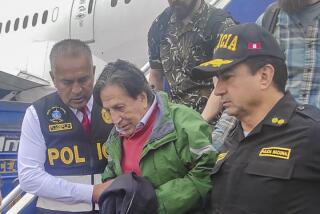Paternity Test a Must for Peru’s President
- Share via
TRUJILLO, Peru — A judge has ordered Peruvian President Alejandro Toledo to undergo a DNA test on Aug. 7 to settle a paternity dispute involving a 14-year-old girl, in the latest in a series of embarrassments and setbacks that have plunged the reformist leader’s popularity to perilously low levels.
Toledo, who took office last July, faces crises of confidence on several fronts. Winner of a special election that overturned a previous vote allegedly rigged by disgraced former President Alberto Fujimori, he is trying to manage a faltering economy and tighten a loosening grip on the reins of power.
In a vivid sign of Toledo’s weakness, several hundred rice farmers paralyzed the region around the northern city of Tumbes on Thursday and Friday by blockading traffic on the Pan-American Highway, Peru’s principal north-south corridor. Buses, trucks and cars were backed up for miles in both directions.
The blockade took place near one of Peru’s most heavily fortified military bases. But the president didn’t forcibly disperse the protesters for fear of causing more violence, observers said.
The demonstration was only the latest of several such confrontations in recent weeks.
Last month, one person was killed in rioting in the southern town of Arequipa after Toledo reversed a campaign promise not to privatize the local electricity utility. Violence erupted after the government unilaterally announced that it was going ahead with a sale of that utility and one other to the Belgian concern Tractebel for $167 million.
A 30-day state of emergency was declared, and 1,700 soldiers and police were brought in to quell the disturbance.
The utility sale has been put on hold pending a court decision, but eight journalists who covered the disorder have been charged with “inciting terrorism.”
Privatization of state-owned utilities and other companies in Latin America has proved increasingly unpopular in several nations, where waves of layoffs and higher service prices have resulted. But opposition has been especially militant in Peru, with demonstrators fighting privatization of ports, forests and power firms.
Toledo’s government needs the cash from privatizations to help make up for a significant projected budget deficit.
A recent poll by the weekly newsmagazine Caretas showed that Toledo’s approval rating has slid to 16%, down from 60% a year ago. More than 82% of those polled disapproved of the way Toledo is handling his job. There have been increasing calls for him to reshuffle his Cabinet.
The DNA ruling Friday by Family Court Judge Carmen Kcomt in the northern coastal city of Piura threatens to cripple Toledo’s presidency even more if the tests prove positive, further damaging his credibility. In a long-running legal battle, Toledo has denied that the girl, named Zarai, is his daughter.
Luis Solari, a member of Congress and a Toledo ally, said: “The president will go along with all mandates of the judiciary. But let’s not politicize the Zarai case.”
The girl’s mother, Lucrecia Orozco, has said that Toledo fathered the child during a liaison they had when he was a business school professor and already married. She has persisted in the case although a family court several years ago found in Toledo’s favor. That ruling came despite a blood test Toledo took that indicated a 97% probability that he was the girl’s father.
Toledo’s lawyers say they will appeal Friday’s ruling to the Supreme Court, claiming that the paternity claim is politically motivated. The legal battle became an issue in the late stages of last June’s election, which Toledo won against ex-President Alan Garcia.
The well-spoken Zarai uses Toledo as her last name and has built a public following. Toledo did not comment on the ruling.
More to Read
Sign up for Essential California
The most important California stories and recommendations in your inbox every morning.
You may occasionally receive promotional content from the Los Angeles Times.













